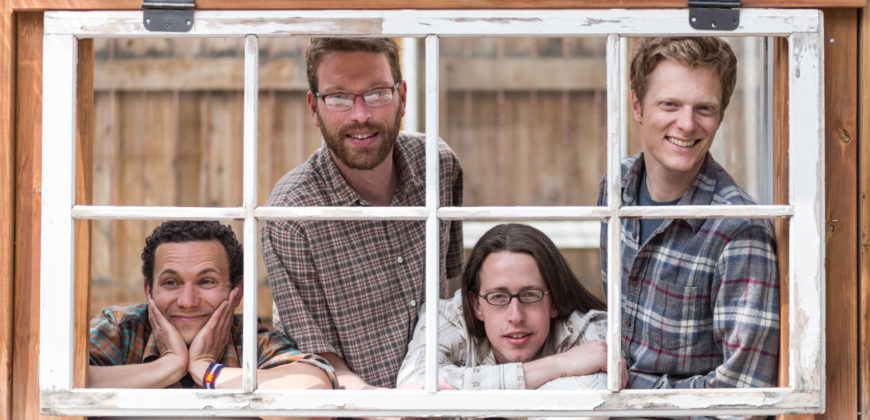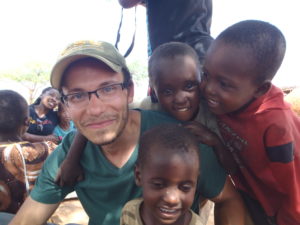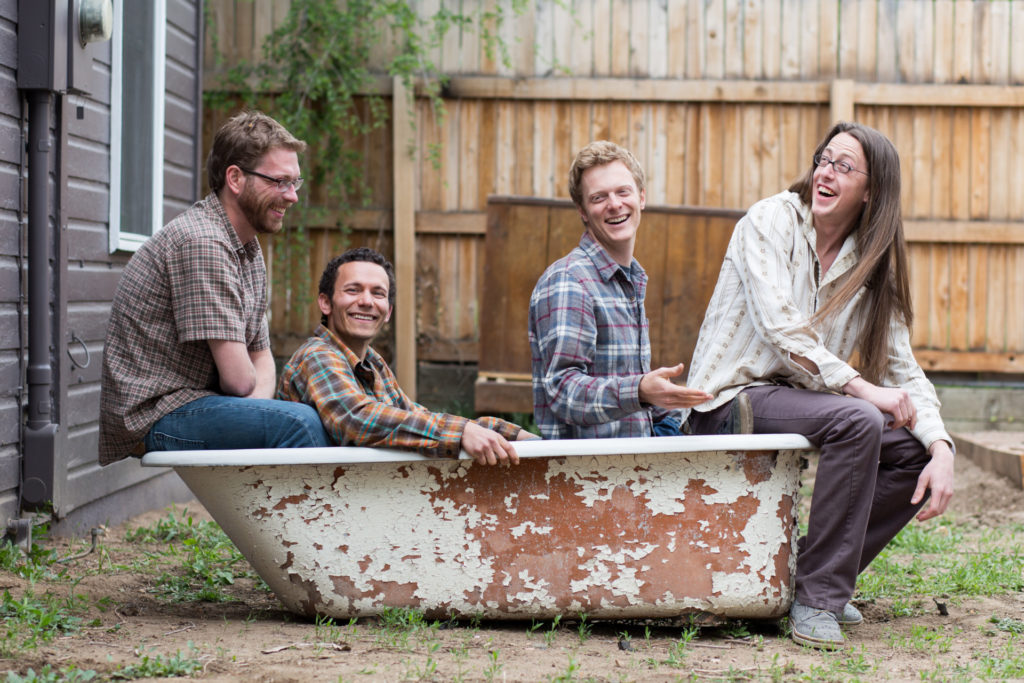
I saw the mountain die
I watched the river dry
Through mire and darkened sky
A sad call piercing through the night
Matt Luizza and Steve Chignell penned the opening lines of “Different Coyote” while on a research trip to Ethiopia. It’s now the title track on a new album produced by their band, Prester John.
The CD will be released in early August, but Luizza is just as focused on his upcoming move from Colorado State University to Washington, D.C. The instructor in the Department of Human Dimensions of Natural Resources is starting a two-year fellowship in September with the U.S. Fish and Wildlife Service International Affairs program.
CD release party
See Prester John with the Covz at the Aggie Theatre on Friday, Aug. 5. Doors open at 8 p.m. If you’re 21 years of age or older, you’ll get in free before 10 p.m. You must be at least 16 to attend the concert.
Luizza will join the service’s Africa Program, where he’ll work on issues including poaching and illegal wildlife trafficking.
“What was key for me was being able to work on the African continent,” he said. “I wanted to stay connected to the people and places that I care about, especially East Africa, where I did some of my dissertation work.”

Luizza received his undergraduate and master’s degrees from CSU, focusing on history and political science, with an emphasis on environmental issues and policy. Luizza also recently completed his Ph.D. through the Graduate Degree Program in Ecology.
Luizza also plans to maintain ties to his CSU research on community-based conservation and indigenous ecological knowledge.
“I’m a CSU lifer,” he said, reflecting on the many years he’s spent in Fort Collins.
Fellowship a natural next step
He pursued a doctorate in ecology to better understand the science behind policies he was exploring theoretically. Landing a Science and Technology Policy Fellowship through the American Association for the Advancement of Science is a natural next step for the ethno-ecologist, as he describes himself.
The competitive interview process for the fellowship was long and arduous. Luizza made it to the round of finalists and traveled to D.C., where he interviewed, speed dating-like, with agencies including the U.S. Department of Energy, NASA, the National Science Foundation, U.S. State Department and the U.S. Agency for International Development. He made a match with his first choice, the fish and wildlife service.
Luizza will be based in D.C., but will travel to Central Africa to work with governments, nongovernmental organizations, and local communities doing conservation work. His new office is “leading the charge” against wildlife trafficking and poaching. “It’s a small office, but they’re at the forefront of really critical and high-profile decisions going on right now,” he said.
Focused on ecological research
Prior to applying for the AAAS fellowship, Luizza spent the last year working in the Natural Resource Ecology Lab for Paul Evangelista, the research scientist who served as a co-advisor for his graduate studies.
Evangelista saw Luizza’s leadership skills early on, when the NASA DEVELOP program was just starting out at CSU. It has subsequently become one of the top programs in the country.
“Matt and Steve were our early team leaders, and without question, having both of them on board led to the program’s rapid success,” said Evangelista, who is also an associate professor in the Department of Ecosystem Science and Sustainability.
Evangelista said he expects to see great things from Luizza in the years to come.
“Matt has very novel perspectives of the world,” Evangelista said. “His thinking is not bound by boxes, particularly those of a single discipline, culture, political or religious view. Matt has always had very thoughtful perspectives that will be critical for addressing today’s global challenges.”
He’s with the band
And what’s this about a band? In 2014, Luizza and Chignell, a graduate student in the Department of Ecosystem Science and Sustainability, were in Northwest Ethiopia near Lake Tana, the headwaters of the Blue Nile with Amanda West, fellow Ph.D. student in the Graduate Degree Program in Ecology. The power went out in their hotel one night.
“We lit a bunch of candles, and Steve and I were playing music,” Luizza said. “We wrote a vast majority of ‘Different Coyote,’ and we decided in that moment to make a legitimate band.”
Upon returning to Fort Collins, they recruited banjo player Rich Fordham and Corey Smith, who plays keyboards. They’ve also tapped the local talent pool to work with a cellist, drummer and a bass player.

“We got a group of really phenomenal musicians together for the CD and have been recording that for nearly a year,” Luizza said. “We haven’t been rushed and it’s been a really great creative process.”
The band’s name, Prester John, comes from a 12-century mythical Ethiopian emperor; it makes sense given the band’s origins. “Nobody knows if he existed,” Luizza said. “But that name always comes up in some form when I’ve read about the history of the country.
“It also has this nice, folksy kind of Americana ring to it that fit our musical style,” he added.
The band has only played a few gigs to date, including a show at FoCoMX 8 in April. Evangelista said the music has a unique sound that reflects how Matt and Steve are not “bound by boxes.” Chignell, a classically-trained musician, said the band’s influences span rock, classical, blues, choral, bluegrass and singer-songwriter genres.
Luizza admitted that his international research and graduate work have greatly diminished his musical career. But he’s determined to make the most of the CD release experience. He and his bandmates hope to continue to make music, although they will soon be living in different parts of the country.
“At a minimum, Steve and I and the other members will be sending ideas through Garage Band,” Luizza said. They’ve even talked about having Skype practices and, when feasible, they’ll visit each other and book a few shows.
As for the future., Luizza said he sees the potential to return to academia. “I love teaching, or I could see myself eventually going back into more of a research teaching role,” he said.
The AAAS fellowship could also lead to a career with a federal agency. He might also return to working for a nonprofit; Luizza was at one point a community organizer working on immigration reform.
He’s not bound by boxes, in his music or life.
Luizza was previously the recipient of a three-year U.S. Department of Agriculture National Institute of Food and Agriculture fellowship. He was also a Sustainability Leadership Fellow through the School of Global Environmental Sustainability, a graduate student and Team Fellow through the Center for Collaborative Conservation and a Research Fellow at the Africa Center at CSU.
The Department of Human Dimensions of Natural Resources is in the Warner College.